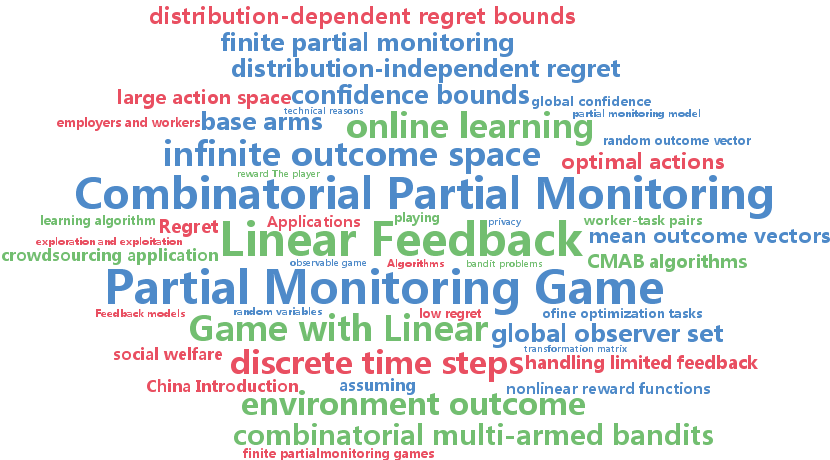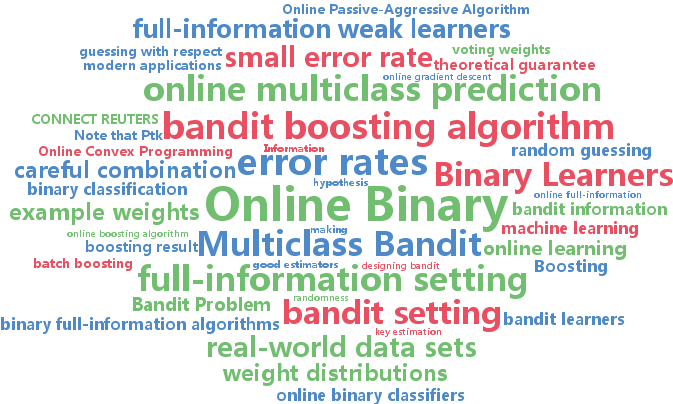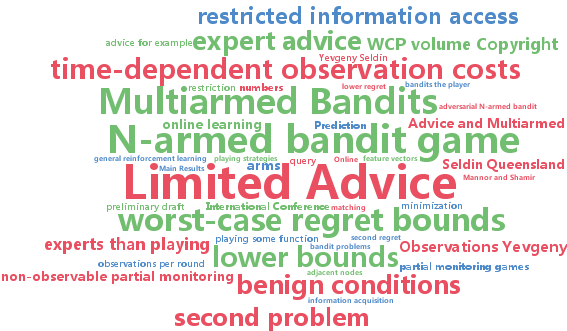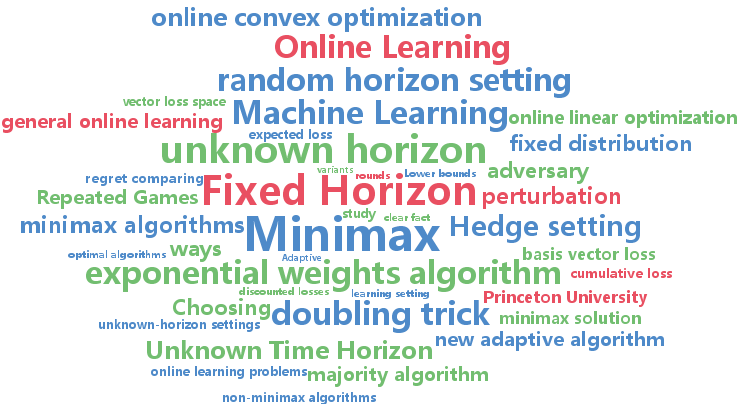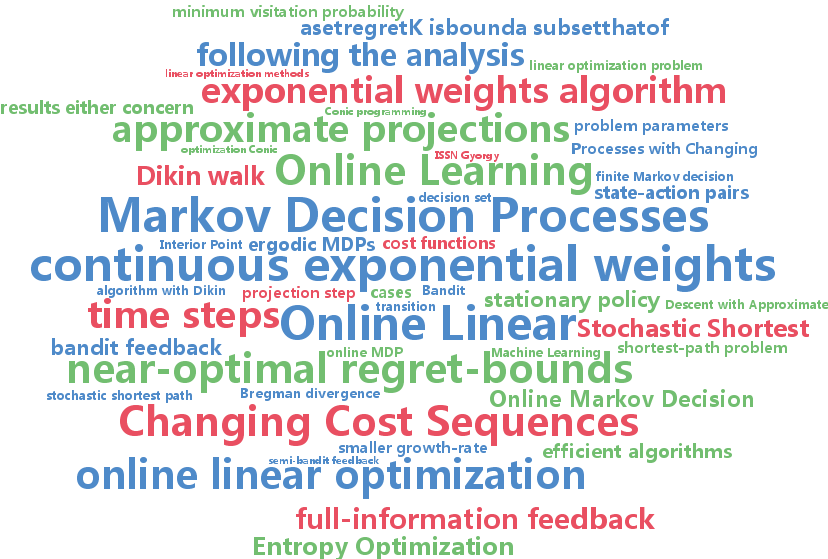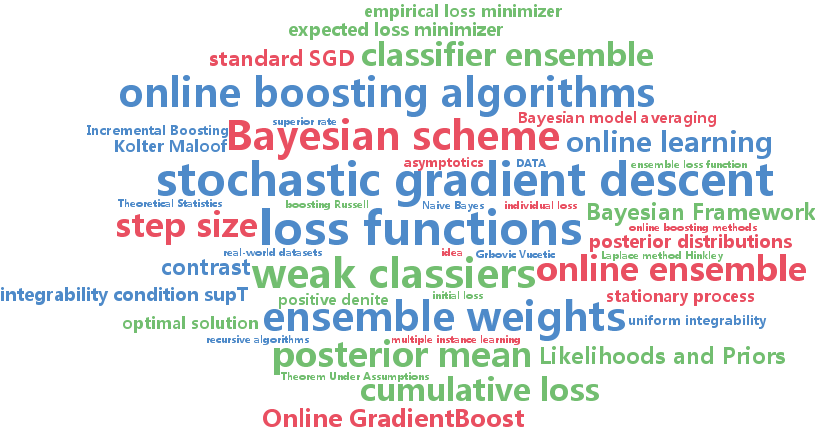online learning
-
Panagiotis Toulis and Edoardo Airoldi and Jason Rennie
Statistical analysis of stochastic gradient methods for generalized linear models (pdf)
We study the statistical properties of stochastic gradient descent (SGD) using explicit and implicit updates for fitting generalized linear models (GLMs). Initially, we develop a computationally efficient algorithm to implement implicit SGD learning of GLMs. Next, we obtain exact formulas for the bias and variance of both updates which leads to two important observations on their comparative statistical properties. First, in small samples, the estimates from the implicit procedure are more biased than the estimates from the explicit one, but their empirical variance is smaller and they are more robust to learning rate misspecification. Second, the two procedures are statistically identical in the limit: they are both unbiased, converge at the same rate and have the same asymptotic variance. Our set of experiments confirm our theory and more broadly suggest that the implicit procedure can be a competitive choice for fitting large-scale models, especially when robustness is a concern.
-
Tian Lin and Bruno Abrahao and Robert Kleinberg and John Lui and Wei Chen
Combinatorial Partial Monitoring Game with Linear Feedback and Its Applications (pdf)
In online learning, a player chooses actions to play and receives reward and feedback from the environment with the goal of maximizing her reward over time. In this paper, we propose the model of combinatorial partial monitoring games with linear feedback, a model which simultaneously addresses limited feedback, infinite outcome space of the environment and exponentially large action space of the player. We present the Global Confidence Bound (GCB) algorithm, which integrates ideas from both combinatorial multi-armed bandits and finite partial monitoring games to handle all the above issues. GCB only requires feedback on a small set of actions and achieves $O(T^{\frac{2
-
Shang-Tse Chen and Hsuan-Tien Lin and Chi-Jen Lu
Boosting with Online Binary Learners for the Multiclass Bandit Problem (pdf)
We consider the problem of online multiclass prediction in the bandit setting. Compared with the full-information setting, in which the learner can receive the true label as feedback after making each prediction, the bandit setting assumes that the learner can only know the correctness of the predicted label. Because the bandit setting is more restricted, it is difficult to design good bandit learners and currently there are not many bandit learners. In this paper, we propose an approach that systematically converts existing online binary classifiers to promising bandit learners with strong theoretical guarantee. The approach matches the idea of boosting, which has been shown to be powerful for batch learning as well as online learning. In particular, we establish the weak-learning condition on the online binary classifiers, and show that the condition allows automatically constructing a bandit learner with arbitrary strength by combining several of those classifiers. Experimental results on several real-world data sets demonstrate the effectiveness of the proposed approach.
-
Yevgeny Seldin and Peter Bartlett and Koby Crammer and Yasin Abbasi-Yadkori
Prediction with Limited Advice and Multiarmed Bandits with Paid Observations (pdf)
We study two problems of online learning under restricted information access. In the first problem, \emph{prediction with limited advice
-
Haipeng Luo and Robert Schapire
Towards Minimax Online Learning with Unknown Time Horizon (pdf)
We consider online learning when the time horizon is unknown. We apply a minimax analysis, beginning with the fixed horizon case, and then moving on to two unknown-horizon settings, one that assumes the horizon is chosen randomly according to some distribution, and the other which allows the adversary full control over the horizon. For the random horizon setting with restricted losses, we derive a fully optimal minimax algorithm. And for the adversarial horizon setting, we prove a nontrivial lower bound which shows that the adversary obtains strictly more power than when the horizon is fixed and known. Based on the minimax solution of the random horizon setting, we then propose a new adaptive algorithm which ``pretends'' that the horizon is drawn from a distribution from a special family, but no matter how the actual horizon is chosen, the worst-case regret is of the optimal rate. Furthermore, our algorithm can be combined and applied in many ways, for instance, to online convex optimization, follow the perturbed leader, exponential weights algorithm and first order bounds. Experiments show that our algorithm outperforms many other existing algorithms in an online linear optimization setting.
-
Travis Dick and Andras Gyorgy and Csaba Szepesvari
Online Learning in Markov Decision Processes with Changing Cost Sequences (pdf)
In this paper we consider online learning in finite Markov decision processes (MDPs) with changing cost sequences under full and bandit-information. We propose to view this problem as an instance of online linear optimization. We propose two methods for this problem: MD^2 (mirror descent with approximate projections) and the continuous exponential weights algorithm with Dikin walks. We provide a rigorous complexity analysis of these techniques, while providing near-optimal regret-bounds (in particular, we take into account the computational costs of performing approximate projections in MD^2). In the case of full-information feedback, our results complement existing ones. In the case of bandit-information feedback we consider the online stochastic shortest path problem, a special case of the above MDP problems, and manage to improve the existing results by removing the previous restrictive assumption that the state-visitation probabilities are uniformly bounded away from zero under all policies.
-
Jacob Steinhardt and Percy Liang
Adaptivity and Optimism: An Improved Exponentiated Gradient Algorithm (pdf)
We present an adaptive variant of the exponentiated gradient algorithm. Leveraging the optimistic learning framework of Rakhlin & Sridharan (2012), we obtain regret bounds that in the learning from experts setting depend on the variance and path length of the best expert, improving on results by Hazan & Kale (2008) and Chiang et al. (2012), and resolving an open problem posed by Kale (2012). Our techniques naturally extend to matrix-valued loss functions, where we present an adaptive matrix exponentiated gradient algorithm. To obtain the optimal regret bound in the matrix case, we generalize the Follow-the-Regularized-Leader algorithm to vector-valued payoffs, which may be of independent interest.
-
Qinxun Bai and Henry Lam and Stan Sclaroff
A Bayesian Framework for Online Classifier Ensemble (pdf)
We propose a Bayesian framework for recursively estimating the classifier weights in online learning of a classifier ensemble. In contrast with past methods, such as stochastic gradient descent or online boosting, our framework estimates the weights in terms of evolving posterior distributions. For a specified class of loss functions, we show that it is possible to formulate a suitably defined likelihood function and hence use the posterior distribution as an approximation to the global empirical loss minimizer. If the stream of training data is sampled from a stationary process, we can also show that our framework admits a superior rate of convergence to the expected loss minimizer than is possible with standard stochastic gradient descent. In experiments with real-world datasets, our formulation often performs better than online boosting algorithms.

